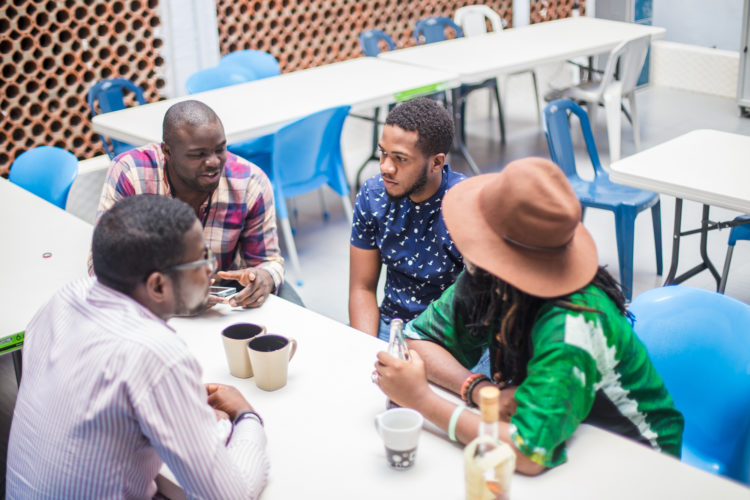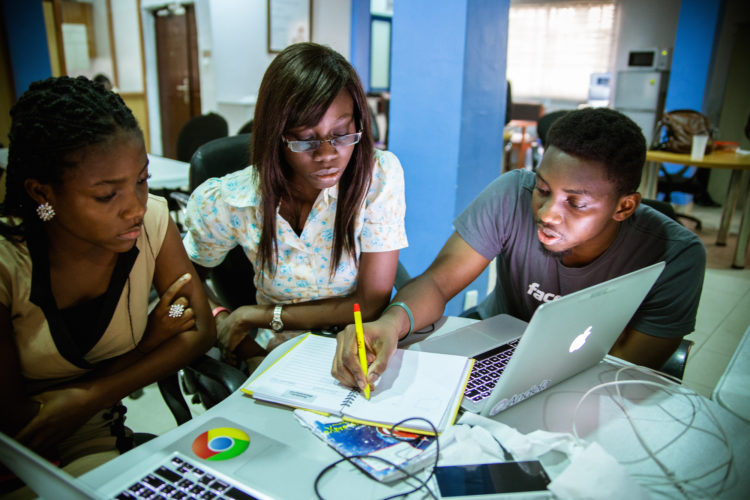When it was announced, in early June, that Mark and Priscilla Zuckerberg had led the USD$24 million investment round that is now fuelling the growth of Andela, all of a sudden everyone wanted to know what Andela was, what the company did, and what it was about the 25-year-old co-founder Iyinoluwa Aboyeji that justified such an important vote of confidence.
During that June week, several people called and emailed me about Andela, including two French journalists who cover the African tech scene. I told them that I had met Iyinoluwa three years ago, at a reception hosted by Harambe Entrepreneur Alliance founder Okendo Lewis Gayle at the Harvard Club in New York City. Harambe is a transnational network for promising young African students thinking of venturing into entrepreneurship.

After Iyinoluwa’s presentation, Okendo introduced Iyinoluwa to my business partner David Ly and me. At that time, David and I were still ideating on what would become TRUE Africa. I told Iyinoluwa that I’d enjoyed the way he’d presented his startup idea, and spoken clearly and convincingly, without seeming desperate, about his need for immediate startup capital.
I remember being struck and somewhat charmed by his sense of purpose.
He smiled, seemed pleased at the compliment, and I remember being struck and somewhat charmed by his sense of purpose. He was clearly a very driven young man who knew what he wanted and how he might get there, but there was a sparkle in his eyes that endeared him to me. (David later told me he had the same feeling about him.)
David and I then proceeded to listen to his full story and what we heard that evening was the tale of a budding entrepreneur who seemed determined to contribute to African development through technology. Iyinoluwa emailed me the next day, and we started corresponding around leads in African technology.
That evening at the Harvard Club, David and I spoke with another gentleman in the room, who told us he was a US-based South African executive working in finance. His name was Pule Taukobong and he was thinking of quitting his high paying job to focus, full time, on investing in African startups. He told us that Iyinoluwa’s venture idea was one that he was particularly impressed with.
Iyinoluwa and I stayed in touch via social media and a little more than a year later I ran into him again, at yet another Harambe event organised by Gayle. This time, the reception was held in one of the student meeting rooms on the campus of Harvard University.
Pule was one of the first people who spoke that evening, and while he was sharing his story, and promoting Africa Angels Network, his aptly-named new angel fund, I noticed that Iyinoluwa was very attentive. Essentially, Pule said that he was set to invest his entire savings, even selling his own house, in order to be able to support new ventures like Iyinoluwa’s. One could sense the sacrifice and the financial pain in every one of Pule’s words, but the speech was uplifting because of its optimism. Everyone could sense that he was one relatively inexperienced investor taking bets on a few unknown startups that had yet to prove the viability of their business models. Yet everyone was rooting for him and cheering him on.
Applications had jumped from 15,000 in 2015 to 40,000 this year and that the number of Andela fellows had doubled in the past year.
Last month, on June 18, less than a week after the Zuckerberg investment made headlines around the financial world, I reached out to Iyinoluwa again, and asked him how he felt about all the attention. We had a very interesting Skype conversation about a week later. There had been a couple of critical articles in the tech press, but I had heard of the growth of Andela, which, at its core, is essentially a highly competitive coding academy for young Africans who are interested in furthering their skills. I was told that applications had jumped from 15,000 in 2015 to 40,000 this year and that the number of Andela fellows had doubled in the past year.

Iyinoluwa spends most of his time in Lagos, but in the last couple of months he has been taking educational classes in Silicon Valley and in other parts of the US. He has been focused on business development courses as well as technology courses, mostly in the new fields that Andela is interested in entering.
I knew that he had struggled a lot in the first couple of years working on previous startups. So I asked him about the breakthrough with his co-founder, and now CEO, Jeremy Johnson (an EdTech wunderkind who had already taken a previous company public), and the moment they came across an idea that just two years later would be a growing company with real employees and real revenues as well as the talk of the continent’s tech scene.
‘One day, Jeremy and I met up in New York, and we started talking and thinking about what we could do next,’ he remembered. ‘We thought of a few things and then eventually we settled on what would become Andela. This new model around developing skills seemed to work really well from the start. And we realised that ultimately, it’s really about finding young people who are passionate about what they do, then optimising their learning environments, then monetising the skills that they’ve been able to acquire.’







